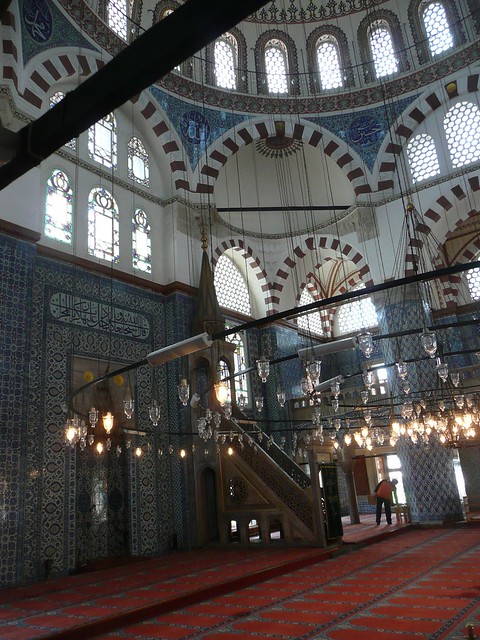First of all Why Sinan?
We will come to biography of him in a bit but lets try to talk about the importance of Sinan for Turks and Ottomans: When you look at the history of Ottomans, 16th century was the golden century for them..16th century was the peak of the ottoman rising. Four / five names can be used to represent this era of the history for Ottomans: Kanuni, Istanbul, Suleymaniye /Selimiye and Sinan.

In the West, philosophers or artists can become symbols for nations. Shakespeare for British, Goethe for Germans, Michelangelo/Leonardo for Italians for example. For Turks as well as the heroic sultans, culturally, Sinan can be the name that we can identify with.. Sinan´s name represents the essence of Ottoman architecture. What he has done for Ottomans and especially for Istanbul have never been parallelled by any other architects!!
Sinan was one of the devshirmes of Yavuz Sultan Selim. He was from Kayseri Agirnas and he was also, most likely, a Greek. He himself was a great example of how Ottomani state system was worked: "The system would take your hand and lift you up through the state depending on your ability".. However, the question has always been asked, even today:
was Sinan a Turk?
Well, we know that there was a huge attempt to prove that he was a Turk ethnically but the documents we have today show that he was a devshirme and he was taken from Agirnas Kayseri. The proof consists of some letters from the time. Sinan himself wrote a letter to the sultan asking for his relatives to be forgiven from a forced relocation after the conquering of Cyprus. And the sultan exempted his relatives from this deportation. According to the historians, the village, Agirnas, was completely a Greek village with no Armenian population.. And again according to the census of population at 1584, out of 189 tax paying people, only 5 of them were registered as Muslims..(Actually, this attempt to prove that Sinan was a Turk ethnically is a bit legendary.. Recently, there was a news article about how his grave yard was opened at the beginning of 1930s and his skull was measured by Turkish Historical Society -see the link- to show that he was an ethnic Turk.!!!)
He was the chief imperial architect at the time when the empire was at its richest period and when the most construction was going on in the empire´s capital.
This was the chance Sinan had. This chance gave Sinan the ability to transform the city, ability to stamp Istanbul as the Turkish city!!What is known about Sinan is not much unfortunately.. Nobody knows very much about what kind of person he was, what he thought about the art and architecture in general. This also explains what it was like at the time.
In the end, Sinan himself was a product of a system where everybody´s duty was outlined as ´working for the empire, the sultan and everything is done for Islam itself´. Everybody was a subject of the sultans. Sinan produced all those monuments in that type of world. That is what life was like at the time for the people we call Anatolian Turks. In the end what we know about Sinan is his buildings as an architect not a person with his thoughts/ideas..
Sinan did not only work as an architect, but he was like a Minister of Development. That position and the architecture were kind of two headed - completely two different jobs for him.. That is quite important when we think and try to understand what Sinan was with today´s measurements. He possibly had the desire to be very powerful, to make monumental buildings and sometimes he possibly received threats to himself from Sultans/Pashas/vazirs etc. But in the end, Sinan was the domineering person for almost half a century over the empire´s resources...
His real birthday is unknown and it is thought to be between 1494 and 1499.. He was recruited in 1512 as devshirme. He was the first child, recruited for this purpose from that area. His father was a stone mason and carpenter. He participated in Belgrade campaign as a Janissary and then Rhodes campaign, Battle Of Mohac in 1526, siege of Vienna in 1529 , then In 1535 he participated in the Baghdad campaign as a commanding officer of the Royal Guard. In 1537 he went on expedition to Corfu and Apulia and finally to Moldavia (in which he constructed a bridge in a marshland very quickly). It was a year later, in 1538, when he was appointed to the post of Mimarbasi (chief architect)
We also know that Sinan had 5 daughters and 2 sons, and that he died in 1588. Because he was a janissary in 1521 and training for becoming a janissary being taken at 15 yo, he must have died at around 90 years old.. He was the head architect to Kanuni (the law maker) Suleyman (Suleiman the Magnificent) for 28 years, 8 years to Selim II and 14 years to Murat III.. He was buried in Suleymaniye. When he died, he owned 23 houses, 34 shops, 1 mill, 1 big garden, 5 water fountains, 3 schools etc. He also had a place for his slaves and concubines (in his will, he asked them to be freed when he departed).
I don´t have much free time these days but as soon as I do, there will be :
-Architect Sinan -II : Some works of Sinan (Sehzade Mosque, Suleymaniye Mosque, Uskudar Semsi Pasa Mosque etc)
- Architect Sinan -III: Sinan´s answer to Hagia Sophia (Islam´s answer to Christianity in the times of classical architecture? ).. Edirne Selimiye Mosque
Some of his monuments:
Sehzade Mosque

Suleymaniye Mosque


Rustem Pasa Mosque

Hisyam, sufler, hedef and inatcicadi liked this column
This column was read by 27347 unique visitors
|

